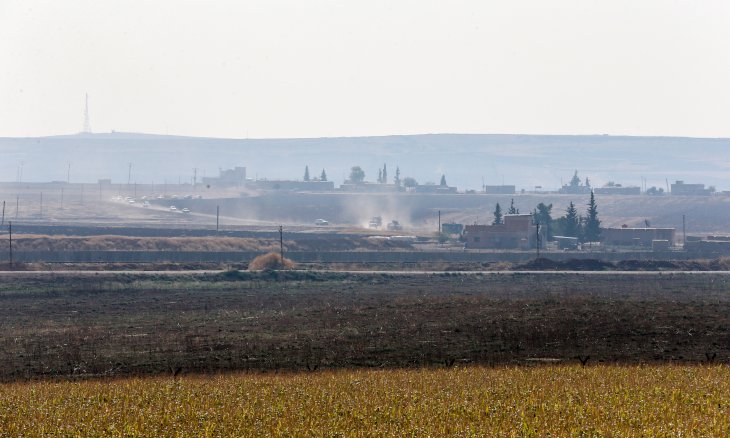Assad says YPG-controlled northeast Syria must return to state authority
Syrian President Bashar al-Assad has said that Damascus' main goal is to gain control of YPG-controlled areas, as Turkish and Russian troops start their joint ground patrols.
Duvar English/Reuters
Syrian President Bashar al-Assad said on Oct. 31 that his government's ultimate goal was to restore state authority over areas controlled by the People's Protection Units (YPG) in northeast Syria, while adding that it would be "gradual."
In a state television interview, Assad also said that a deal between Turkish President Recep Tayyip Erdoğan and Russian President Vladimir Putin to drive out the from a 30 kilometer "safe zone" along the border was a "positive" step that would help Damascus achieve its goal.
"It might not achieve everything ... it paves the road to liberate this area in the near future we hope," said Assad.
Upon U.S. President Donald Trump's decision to withdraw U.S. troops from northeastern Syria, Turkey launched its Operation Peace Spring to clear its border from the YPG-led Syrian Democratic Forces (SDF) and create a "safe zone" for the return of Syrian refugees.
The SDF, which Turkey perceives as a terrorist group due to its links with the Kurdistan Workers' Party (PKK), then turned to Damascus and reached a Russian-brokered deal with the Syrian army.
While the PKK is designated as a terrorist organization by Ankara, Washington and the European Union, the YPG was the main U.S. ally in the fight against ISIS.
Assad also said Trump's decision to keep a small number of U.S. troops in the Kurdish-held areas of Syria “where they have the oil” showed that Washington was a colonial power that was doomed to leave once Syrians resist their occupation as in Iraq.
But he said his country could not stand up to a great power such as the United States and that ending the presence of American troops on Syrian soil was not achievable soon.
Assad says Trump is the best American president
Assad said Trump was the "best American president" for his "complete transparency" about intentions to maintain control of Syria's main oilfields in Deir al-Zor province.
U.S. troops have begun deployment in the province in coordination with the SDF to increase security and continue the fight against remnants of ISIS, a U.S. military spokesman said on Oct. 31.
Diplomats say the U.S. decision to prevent oil fields from falling back to government control would deny Damascus millions of dollars of much needed revenues and ensure its Kurdish ally a main source of income to govern areas it controls.
The Kurds would not be asked to immediately hand over their weapons when the Syrian army enters their areas in a final deal with them that brings back state control to the large swathe of territory they now control, Assad said in the interview.
"There are armed groups that we cannot expect they would hand over weapons immediately but the final goal is to return to the previous situation, which is the complete control of the state," he said.
SDF commander Mazloum Kobani has said the agreement with Damascus could pave the way for a political solution to be worked out later with the Syrian government, that could guarantee Kurdish rights in Syria.
But he insisted at this stage it was only to allow the deployment of Syrian troops across SDF stronghold areas along the border with Turkey in a move to thwart Ankara's plan to create a "safe zone."
Syria had a right to defend its territorial integrity against "separatist Kurds who aspired to create a Kurdish state and rule over Arabs and other ethnic groups," Assad said.
SDF turns government proposal down
A day earlier, the Syrian government called on the Kurdish groups to join the official military. But the SDF turned down the proposal.
It said "a unity of ranks must proceed from a political settlement that recognizes and preserves the SDF's special status and structure."
Such a move would also require "a sound mechanism to restructure the Syrian military establishment," SDF said in a statement.
During the interview, Assad also said that he didn't want Turkey as an "enemy."
But he said Erdoğan himself was an "enemy" due to policies hostile to Syria, referring to Turkey backing the rebels throughout the war.
Turkey hands over Syrian soldiers
Meanwhile, Turkey has handed over 18 men believed to be Syrian government soldiers who were seized in northeast Syria near the Turkish border earlier this week, the Turkish Defense Ministry said.
The ministry did not say who they were handed over to, but said the move came about after coordination with Russia.
The 18 men were seized during operations southeast of the Syrian border town of Ras al Ain on Oct. 29, the ministry said.

Ras al Ain is within the region targeted by Turkey in the offensive it launched on Oct. 9.
Turkish forces have seized control of some 120 kilometers of land between Ras al Ain and another frontier town Tel Abyad.
Meanwhile, Turkish and Russian troops began conducting their first joint ground patrols in northeast Syria on Nov. 1.
